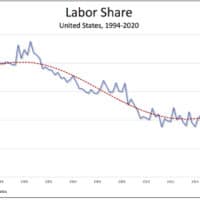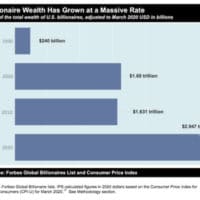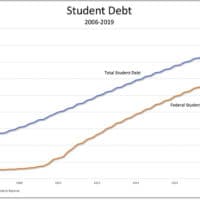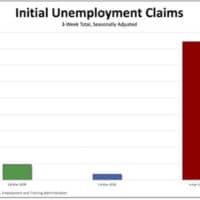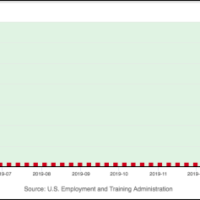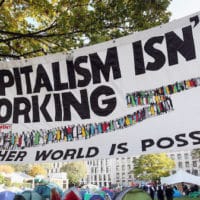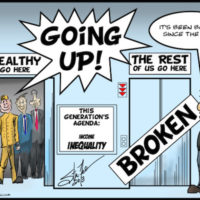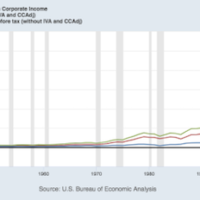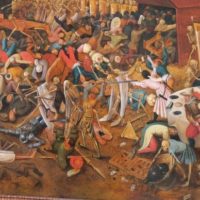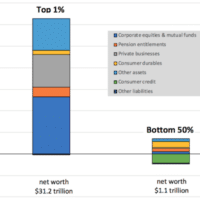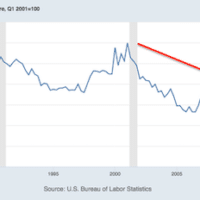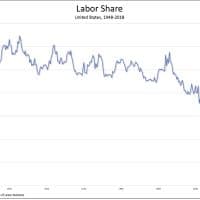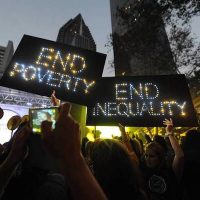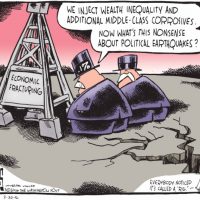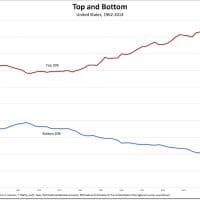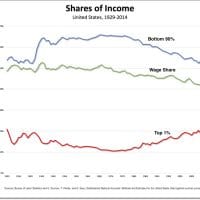-
Reserve army—pandemic edition
In particular, the existence of a reserve army serves to discipline labor, keeping its wage demands in check, since employed workers are forced to compete with unemployed and underemployed workers for the available jobs.
-
The jungle—pandemic edition
Like nursing homes, the U.S. meatpacking industry has become one of the hotspots of the novel coronavirus pandemic.
-
Chart of the day
A new report from the Institute for Policy Studies, “Billionaire Bonanza 2020: Wealth Windfalls, Tumbling Taxes, and Pandemic Profiteers,” reveals that the wealth of U.S. billionaires is indeed staying at home.
-
Student debt jubilee—pandemic edition
The United States is currently experiencing a dystopian orgy of death and destruction.
-
China syndrome
As Donald Trump and his band of “hacks and grifters” are preparing to prematurely reopen the U.S. economy, they’re also rehearsing the language they’ll use to justify their irresponsible decisions. Here’s how Peter Navarro, the White House trade adviser, is discussing the terms of the reopening: The unfair China trade shock that hit so many […]
-
Chart of the day
All told, more than 16 million American workers have filed initial claims during the past three weeks.
-
Chart of the day
Although claims are at record highs, many Americans across the United States have been unable to successfully apply for unemployment insurance because an unprecedented level of claims is overwhelming state labor department websites and jamming up phone lines.
-
Unemployment pandemic
Capitalist crises are neither predictable nor do they stem from a single cause. Instead, at least as I see it, the possibility of a crisis is always there but the causes and triggers are all historical and therefore multiple and varied.
-
What inequality?
Economic inequality in the United States and around the world is now so obscene, and has convinced more and more people to do something about it, that the business press has initiated a campaign to deny its very existence.
-
Taxing the surplus—not
There aren’t many ways ordinary Americans have a say in what happens to the surplus that determines their fate.
-
Dying too young
If there ever was an argument in support of Medicare for All it’s this: despite spending more on health care than any other country, the United States has seen increasing mortality and falling life expectancy for people ages 25 to 64, who should be in the prime of their lives.
-
Wages of debt
Elon Musk’s new Cybertruck would appear to be the perfect design for America’s contemporary dystopia.
-
Changing the subject
From Chile to Lebanon, young people are demonstrating—in street protests and voting booths—that they’ve had enough of being disciplined and punished by the current development model.
-
Time is running out
Richard Reeves is right about one thing: time is crucial to capitalism’s legitimacy. The premise and promise of capitalism are that the future will be better than the present. And “if capitalism loses its lease on the future, it is in trouble.”
-
Promises, promises
They keep promising, ever since the recovery from the Great Recession started more than eight years ago, that the share of national income going to American workers will finally begin to increase. But it’s not.
-
Socialism and exploitation
If you listened to or read the text of President Trump’s State of the Union speech Tuesday night, you might have been surprised by the explicit mention of socialism.
-
Mind the gap
We’re all done singing to “days gone by” (even though no one really knows the lyrics). But, unless we change our tune and resolve to fundamentally alter the way the economy is organized, we’re going to have to face up to the problem that’s been haunting the United States for decades now: growing inequality.
-
Measure for measure
No matter how we measure it, most Americans are falling further and further behind the tiny group at the top.
-
Dollarization in the United States
The United States is increasingly becoming dollarized. That’s because, for decades now, those at the bottom have been left behind, forced to attempt to get by in ever more precarious conditions.
-
Tale of two depressions
Mainstream economists continue to discuss the two great crises of capitalism during the past century just like the pillars of society performed in the brothel—a “house of infinite mirrors and theaters”—in Jean Genet’s The Balcony.

